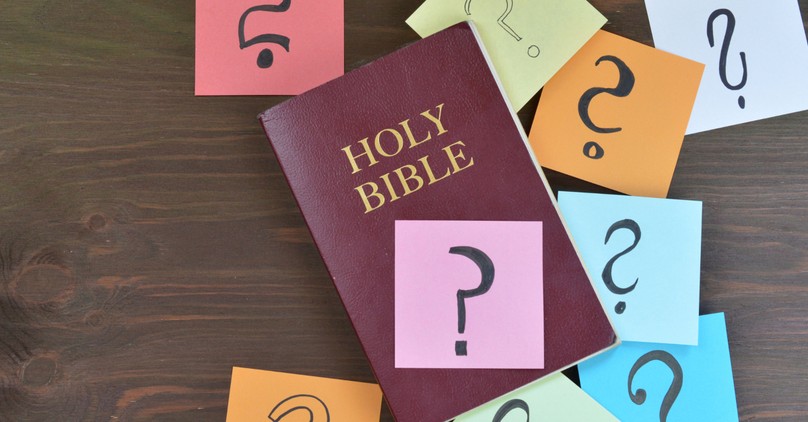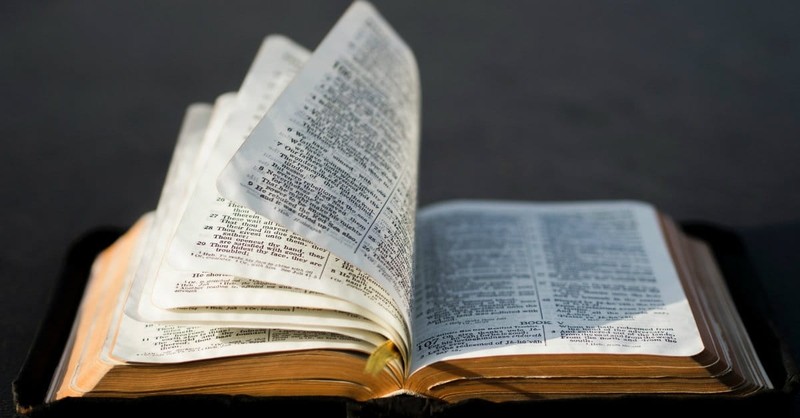
I remember when I finished reading the Bible for the first time. I was happy with the accomplishment but also sad that there were no more books. It did not take long for me to realize that God’s Word is inexhaustible. Some 20 years later and many more times through the Bible, I realize that I’ll never “finish reading” God’s Word.
Yet after that first read through I was indeed disappointed that I’d read the whole story – that is until I picked up my friend’s Bible. She was from a Catholic background and as I thumbed through her Bible, I realized that there were seven books that I’d never read before. Were these Scripture too? Was my Bible missing books?
On occasion that question will press upon believers. In the early 2000’s, with the release of Dan Brown’s The Da Vinci Code, this question became prominent again. This time the concern was over a different set of books that some thought were taken out of the Bible.
So, do we have the complete Bible? Are there books that are missing?
Photo credit: ©Getty Images/Roter Panther

How Did the Bible Come Together?
There are three different concerns when this question is asked. From a Roman Catholic perspective, there are seven books which those of a Protestant persuasion do not consider to be inspired, so these books are “missing” from their Bible. From an Latter Day Saints’ perspective, the entire Book of Mormon is “missing.” Others will point to the “lost books of the Bible” as being removed from the canon during the first couple hundred years after Jesus. So, are there books missing from the 66 books of your Bible?
To answer that question, it is helpful to understand how the Bible came to be. It is common in our day to picture a group of men in the 4th century with a deeply engrained political agenda filtering through a large number of possible Scripture books and declaring them Scripture. As if some were saying, “we like the letter to the Hebrews so we will call that Scripture, we like Paul, but we aren’t big fans of the Shepherd of Hermas or the Gospel of Thomas. The Revelation of John fits our agenda but the Apocalypse of Peter does not, so we’ll cancel that one.”
In this narrative reconstruction it’s as if this group of men all voted and landed on the 27 books we now consider the New Testament. But that’s not exactly how it went down. I am focusing on the New Testament here because if you can establish these as canon, then the Old Testament should not be difficult. Jesus and the apostles declared these 39 books to be the Jewish Scriptures, so we affirm the same. We know that Jesus held these 39 books because of what he said in Luke 24:44;
“Then he said to them, ‘These are my words that I spoke to you while I was still with you, that everything written about me in the Law of Moses and the Prophets and the Psalms must be fulfilled.’”
Moses, Prophets, Psalms is the typical threefold Jewish division of the Scriptures (Law, Prophets, and Writings). This being the accepted Jewish canon has not the subject of much debate. The New Testament, however, is a different story.
Photo credit: Unsplash

Were Books Removed from the Bible?
I wish I could tell you that we already had a firm grasp on the 27 books within the first century, but that is simply not true. The oldest extant list that matches our 27 books is that of Athanasius’ letter in 367 AD. This is where the charge by some that the New Testament canon was adopted in the 4th century comes from. It sounds legit because it has an element of truth to it, but it’s not the whole story. In truth, all 27 books of the New Testament were likely completely by 100 AD. They were widely read and considered to be Scripture in the next 100 years. Many early church writers referred to New Testament passages as Scripture.
What really happened in the 4th century is that a council recognized what had been practiced in the church since the days of the apostles. A heretic, named Marcion, forced the church to make explicit what had been practiced for centuries. Marcion picked which books he liked and which ones he did not. It caused the question of canon to be asked. This is why in the 4th century the early church had to put something in writing which recognizes which books are authoritative and which ones are not.
There is an important distinction to be made here. The canon is not an authorized collection of writings (in that the church conferred authority or approval upon a list of books). Rather, the canon is a collection of authoritative writings. The church recognized their authority, it did not give them authority.
How did they recognize which books were authoritative? Three rules for canonicity were used. First, was it written by or tied closely to an apostle? Secondly, was it widely recognized by the churches? Third, did it conform to the rule of faith—basic orthodox Christianity that had been orally handed down from the apostles and Jesus himself?
The question of whether or not books were “removed from the Bible” is somewhat nonsensical given the process. Were some books considered not-authoritative? Yes. Were they removed? No. They were recognized as not being God-breathed.
Photo credit: Unsplash/Prateek Katyal

What Are the Apocryphal Books?
One set of extra-biblical books are called apocryphal or deuterocanonical. These are the books that are typically found in a Catholic Bible. The books are: Tobit, Judith, Additions to Esther, Wisdom of Solomon, Ecclesiasticus (Sirach), Baruch (+Letter of Jeremiah), Prayer of Azariah, Susanna, Bel and the Dragon, 1 & 2 Maccabees.
These are Jewish literature written in what is known as the intertestamental period (430BC-AD40). These books can be helpful for understanding history, some have entertaining stories, and still others sound similar to wisdom texts or Psalms and Proverbs. So why were they not considered authoritative?
For one, the Jewish people themselves did not regard these works to be the same as God’s Word. They were never cited by Jesus or the New Testament authors (though that is true of some others in the OT), but more importantly by the way Jesus spoke of the Old Testament division, it is clear that he would not have considered these to be on par with Scripture. The Apocryphal books do not claim for themselves the same type of authority as other Old Testament literature. Likely, these book slipped in when Jerome placed them in the Latin Vulgate. He was uncertain of where to place them—though he found them beneficial—so he put them in as disputed literature, but eventually they were accepted by the Catholic Church as Scripture. It’s worth noting that the formal acceptance happened at the Council of Trent in 1546, perhaps as a reaction to Protestantism.
Photo credit: ©Getty Images/Photoboyko

What Are the “Lost Books” of the Bible?
Another set of extra-canonical books are known as pseudepigraphal and sometimes Lost Books of the Bible, or Gnostic gospels. These were mainly written during the first few centuries after Christ and have unknown authors. Pseudepigrapha means fake author; they are falsely attributed to an apostle. As an example, the Gospel of Peter was not written by the apostle Peter. This alone answers the question of why they were not accepted as canonical. But a closer perusal of their content also would make it obvious why these are not recognized as Scripture.
There is also an Old Testament Pseudepigrapha (Secrets of Enoch, Psalms of Solomon, 4th Maccabees, to name a few). It too fails the marks of authenticity and being God-breathed. On occasion they will not only contradict other writings, but they do not match up to the rule of faith. These works typically fail all three tests of canonicity.
There are some letters and writings from the first couple centuries after Christ which are helpful and beneficial (1 Clement, Shephard of Hermas, Didache, etc.) but were not considered to be authoritative. Some of these, like the Shephard of Hermas, were widely read and considered to be beneficial but they ultimately failed the test of being “self-authenticating.”
What about the books which the Latter Day Saints consider to be Scripture? This question actually falls under a different category, new revelation. These too would fail tests of canonicity, but they also fail in regards to whether the canon of Scripture is still open. That is a topic which extends beyond the boundaries of this piece. Yet it is enough to say that the Book of Mormon contradicts the Bible in several places. Furthermore, orthodox Christians reject Joseph Smith as a prophet.
Photo credit: ©Getty Images/yavorskiy

How Can We Be Confident That the Bible Is God's Complete Word?
With all of these disputed books, how can we be confident that we have God’s complete Word? Ultimately our trust in Scripture is a trust in Christ and His ability to faithfully rule over His Bride. Yes, we have been filled with schism. Yes, there are differences of interpretation. But Jesus clearly believed that Scripture (at least the OT) was authoritative and infallible. He believed that the history which was presented was legitimate. Are we to believe that the God who governed all of history so that “at just the right time” a baby was born in a manger, is unable to govern history in such a way to preserve His Word? Of course not.
You can have confidence in your Bible. You can have confidence that the books you have in your Bible are indeed the Words of Scripture. The Scriptures are self-attesting. Reading God’s Word in 1 Timothy will do something different than reading the words of 1 Clement. One is God-breathed, the other is not. Yes, you can find helpful things in 1 Clement, but it will not be self-attesting in the same way 1 Timothy will be. There is not the same power in 1 Clement that there is in 1 Timothy. We can have confidence in God’s Word because it, unlike other literature, does not return empty or void. God’s Word is living and active. Literature is not.
The 66 Books Are Sufficient
That bittersweet moment when I finished reading the Bible quickly dissipated. I soon discovered that God’s Word is not like any other literature that I had read. It is living, it is inexhaustible. I have been a student of the Bible for decades now and it still opens up to me whole new ways of seeing myself, the world, and God. Because of this truth, we do not need other books. The 66 books we have are enough to tell us everything we need to know in order to please God. They are sufficient.
If you are interested in furthering your study of this important topic, I would recommend How We Got the Bible by Timothy Paul Jones, Truth Matters by Andreas Kostenberger, Taking God at His Word by Kevin DeYoung, and 40 Questions on Interpreting the Bible by Robert Plummer.
Photo credit: Unsplash/Priscilla Du Preez
Originally published Wednesday, 06 March 2024.



